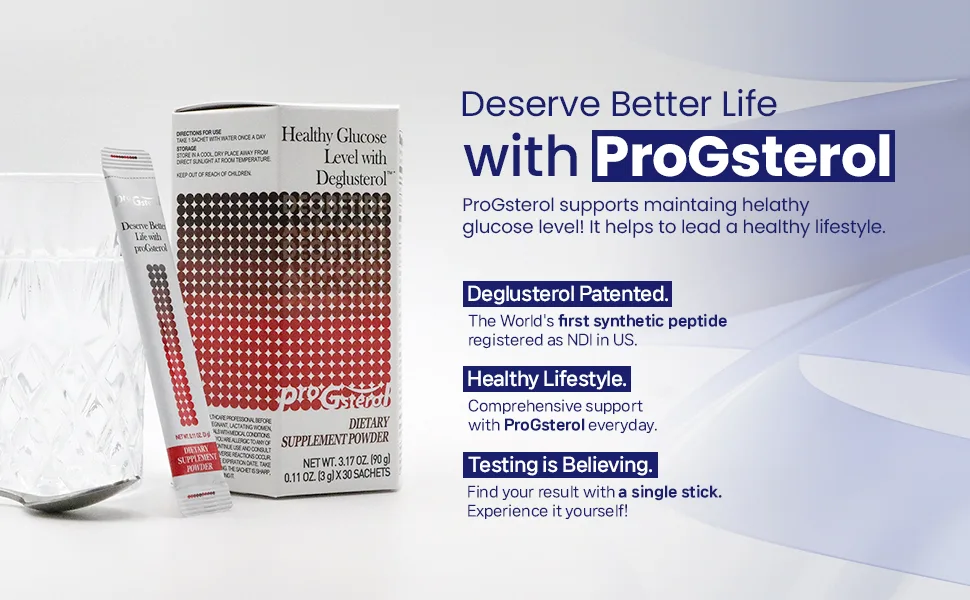What Is ProGsterol? The Role of ProGsterol in the Management and Treatment of Metabolic Syndrome
ProGsterol is an orally administered peptide described as an adiponectin mimetic; in available studies serious adverse events have not been commonly reported. Moreover, unlike conventional antidiabetic medications, ProGsterol does not cause hypoglycemia (low blood sugar), making it completely safe for individuals with diabetes or insulin resistance. By these mechanisms, ProGsterol may represent a highly suitable solution for improving insulin sensitivity and the treatment of metabolic disorders
What Is ProGsterol? The Role of ProGsterol in the Management and Treatment of Metabolic Syndrome
Metabolic syndrome refers to a group of metabolic disorders that increase the risk of developing heart disease, stroke, and type 2 diabetes.
This syndrome includes several factors such as central obesity (abdominal obesity), high blood pressure, elevated blood glucose levels, and abnormalities in the lipid profile, such as increased triglycerides and decreased levels of high-density lipoprotein (HDL). A person who exhibits at least three of these conditions is classified as having metabolic syndrome.
ProGsterol is an orally administered, peptide‑based dietary supplement formulated to address key pathways of metabolic dysfunction, comprising two active constituents, Adiporin and Deobetide. The formulation has been developed to complement standard lifestyle and pharmacological interventions for cardiometabolic disorders and to offer clinicians and patients a targeted, well‑tolerated adjunct aimed at improving metabolic homeostasis.
The Relationship Between Metabolic Syndrome and Insulin Resistance
Metabolic syndrome is diagnosed when an individual fulfills a specified number of metabolic criteria (commonly three or more) including central adiposity, elevated arterial pressure, impaired fasting glucose or glucose intolerance, hypertriglyceridemia and low HDL. Central adiposity promotes a proinflammatory and insulin‑resistant state in adipose tissue, which contributes to systemic insulin resistance. When pancreatic β‑cell compensation is inadequate, persistent insulin resistance leads to sustained hyperglycemia and the development of type 2 diabetes mellitus.
The Role of ProGsterol in Insulin Resistance
ProGsterol exerts multiple effects and mechanisms that contribute to a reduction in insulin resistance and to enhanced insulin‑receptor sensitivity. This supplement directly influences insulin function by improving the ability of cells to absorb glucose from the bloodstream. Since cellular glucose uptake plays a critical role in maintaining normal blood glucose levels, ProGsterol is recognized as an effective agent in reducing insulin resistance.
By enhancing insulin sensitivity, ProGsterol can reduce fasting and postprandial plasma glucose concentrations and thereby favorably influence overall metabolic homeostasis. Consequently, it may serve as an adjunct in the management of conditions characterized by insulin resistance, including type 2 diabetes mellitus. Furthermore, by ameliorating insulin dysfunction, ProGsterol has the potential to lower the long‑term risk of insulin resistance–related comorbidities such as atherosclerotic cardiovascular disease, hypertension and obesity.
Diabetes and the Role of ProGsterol in Its Management and Treatment
Type 2 diabetes mellitus is a chronic metabolic disorder characterised chiefly by peripheral insulin resistance and a progressive loss of insulin effectiveness; despite preserved or elevated insulin secretion in early stages, target tissues (skeletal muscle, adipose and liver) become less responsive to insulin, producing sustained hyperglycemia and increased risk of micro‑ and macrovascular complications.
ProGsterol is an oral, peptide‑based supplement formulated to target mechanisms of dysglycemia. Its active constituents are reported to attenuate insulin resistance, enhance insulin‑receptor sensitivity and improve peripheral glucose uptake, with experimental and some clinical observations linking use to reductions in fasting plasma glucose and modest favorable trends in HbA1c.
These pharmacodynamic effects are biologically plausible, but mainly derive from preclinical work and early clinical observations; the magnitude, durability and long‑term safety of benefit are not yet established in large, high‑quality outcome trials. Accordingly, claims of glycemic benefit should be interpreted cautiously.
Fatty Liver Disease and the Role of ProGsterol in Its Improvement and Treatment
Clinically, ProGsterol should be considered only as an adjunct to evidence‑based pharmacotherapy and lifestyle measure (not as a replacement) and its use should be accompanied by appropriate baseline and follow‑up assessments. Integration should be individualised by clinicians with baseline assessment (e.g., HbA1c, fasting glucose, renal and hepatic function, medication review) and follow‑up to monitor glycaemia, interactions and hypoglycemia risk when combined with insulin or secretagogues.
Non‑alcoholic fatty liver disease (hepatic steatosis) arises from excess intrahepatic triglyceride accumulation due to imbalances in lipid uptake, de novo lipogenesis, oxidation and export; it is closely linked to obesity, insulin resistance and dyslipidemia and may progress to inflammation and hepatic dysfunction.
Preclinical data indicate ProGsterol may influence pathways relevant to hepatic steatosis—such as fatty‑acid synthesis, mitochondrial β‑oxidation and adipocyte inflammatory signalling—with possible effects on intrahepatic lipid content, weight and lipid profiles. These mechanistic and emerging clinical observations suggest ProGsterol may appropriately serve as an adjunct; use should remain individualised with baseline and periodic liver and metabolic monitoring and candid counselling about evidence limitations.
Polycystic Ovary Syndrome (PCOS) and the Role of ProGsterol in Its Management and Treatment
Polycystic ovary syndrome (PCOS) is an endocrine disorder characterised by hyperandrogenism, anovulation and polycystic ovarian morphology; insulin resistance and hyperinsulinemia accompany PCOS, amplifying androgen production, disrupting folliculogenesis and increasing cardiometabolic risk.
ProGsterol is an oral peptide‑based supplement positioned as an adiponectin‑mimetic that may enhance insulin‑receptor responsiveness, improve peripheral glucose handling and support weight reduction. Such mechanisms are biologically plausible yet remain putative for an oral peptide, and robust randomized clinical evidence for meaningful reproductive or sustained metabolic benefit is limited.
Clinically, ProGsterol should complement lifestyle measures and guideline‑directed pharmacotherapies rather than replace them. Baseline and periodic monitoring of metabolic and reproductive parameters is recommended; patients should be counselled on limited efficacy and safety data, variable supplement regulation, potential interactions with glucose‑lowering agents, and specialist review before use in pregnancy, lactation or significant comorbidity.
Characteristics and Significance of ProGsterol Consumption
ProGsterol is an orally administered peptide described as an adiponectin mimetic; in available studies serious adverse events have not been commonly reported. Moreover, unlike conventional antidiabetic medications, ProGsterol does not cause hypoglycemia (low blood sugar), making it completely safe for individuals with diabetes or insulin resistance. By these mechanisms, ProGsterol may represent a highly suitable solution for improving insulin sensitivity and the treatment of metabolic disorders.
Manufacturing and Distribution of ProGsterol by Vira Rahesh Pharmed Pharmaceutical Company
Vira Rahesh Pharmed Pharmaceutical Company, founded and operated by a team of industry experts and academic professionals, is dedicated to the research, development, and production of knowledge-based pharmaceutical products. With a strong foundation in pharmaceutical sciences, medicine, chemistry, and basic sciences, Vira Rahesh Pharmed has achieved substantial progress in developing a diverse portfolio of innovative, science-driven pharmaceutical products.





